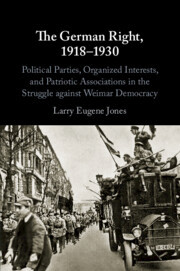The German Right, 1918–1930 Political Parties, Organized Interests, and Patriotic Associations in the Struggle against Weimar Democracy
Langue : Anglais
Auteur : Jones Larry Eugene

Analyzes the role of the non-Nazi German Right in the destabilization and paralysis of Weimar democracy from 1918 to 1930.
The failure of the Weimar Republic and the rise of National Socialism remains one of the most challenging problems of twentieth-century European history. The German Right, 1918?1930 sheds new light on this problem by examining the role that the non-Nazi Right played in the destabilization of Weimar democracy in the period before the emergence of the Nazi Party as a mass party of middle-class protest. Larry Eugene Jones identifies a critical divide within the German Right between those prepared to work within the framework of Germany's new republican government and those irrevocably committed to its overthrow. This split was only exacerbated by the course of German economic development in the 1920s, leaving the various organizations that comprised the German Right defenceless against the challenge of National Socialism. At no point was the disunity of the non-Nazi Right in the face of Nazism more apparent than in the September 1930 Reichstag elections.
Introduction. Setting the context; 1. Revolution and realignment; 2. Infrastructure of the German right; 3. Forging a conservative synthesis; 4. Growth and consolidation; 5. The radical right; 6. 1923: a missed opportunity?; 7. From triumph to schism; 8. Stabilization from the right?; 9. Paladins of the right; 10. The forces of national revival; 11. The road back to power; 12. The burden of responsibility; 13. From defeat to crisis; 14. Reverberations and realignment; 15. The chimera of right-wing unity; 16. Schism and fragmentation; 17. The Brüning gambit; 18. The September earthquake; Conclusion. The price of disunity.
Larry Eugene Jones is Professor Emeritus in the Department of History at Canisius College in Buffalo, New York, where he has taught since 1968. His previous publications include the award-winning German Liberalism and the Dissolution of the Weimar Party System, 1918–1933 (1988) and Hitler versus Hindenburg: The 1932 Presidential Elections and the End of the Weimar Republic (2015).
Date de parution : 12-2021
Ouvrage de 656 p.
15.1x22.8 cm
Date de parution : 04-2020
Ouvrage de 640 p.
15.8x23.5 cm
Thème de The German Right, 1918–1930 :
© 2024 LAVOISIER S.A.S.



